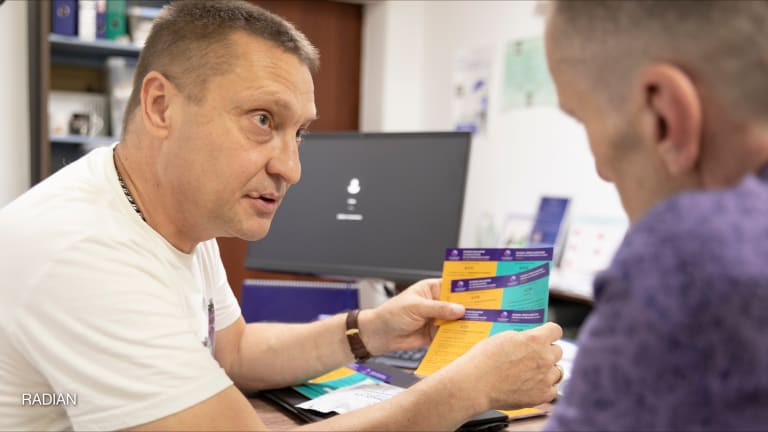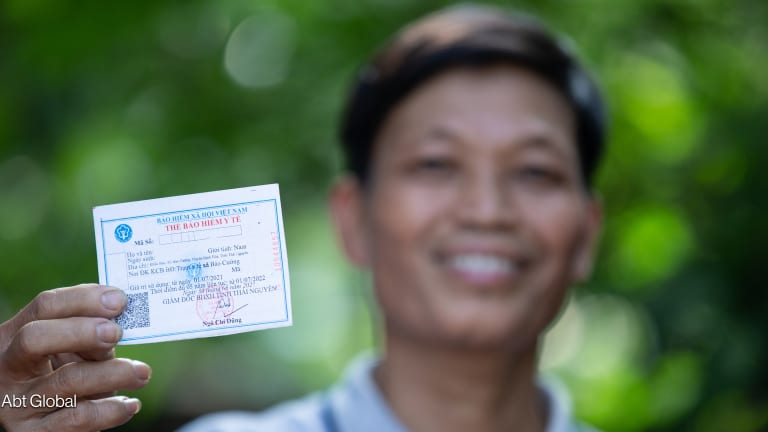Opinion: Why exciting results from vaccine research are just the beginning of efforts to end COVID-19

The news last week and again this week that at least two highly effective vaccines may be on the horizon is a welcome respite from the devastating impact of COVID-19 on global health. In under a year, SARS-CoV-2 has already caused more than 56 million infections and 1.3 million deaths.
Any true analysis of the pandemic’s toll, however, must go beyond those devastating numbers to include the impact of COVID-19 on childhood immunizations, sexual and reproductive health, noncommunicable disease programs, and global efforts to reduce HIV, tuberculosis, malaria, and countless other diseases. With HIV alone, COVID-19 has diminished access to critical prevention and treatment supplies such as condoms and antiretroviral drugs, shuttered clinics, and reduced testing.
Now it appears that an intensive biomedical research effort is producing tools that could help to turn the COVID-19 pandemic around. This welcome and exciting news should be balanced by some important lessons from the HIV experience on the challenges of turning highly effective prevention tools into real and accessible options for people in need.
With HIV, a long-standing commitment to research that engages and respects the communities in which it is conducted has begun paying exceptional dividends in HIV prevention research, even in the midst of this new pandemic. The most recent of these is the success of long-acting cabotegravir injections in slowing HIV infections in both men and women — also big news this month.
Other recent advances include the positive European regulatory opinion on the dapivirine vaginal ring, a promising new HIV prevention option for women; the launch of the Mosaico HIV vaccine trial; and the upcoming release of data from AMP — meaning “antibody mediated prevention” — the first large-scale human study of HIV antibodies to reduce the risk of infection. On the user side, surprising increases in the uptake of PrEP, or preexposure prophylaxis, show that coronavirus-related access barriers are not enough to dampen demand for effective HIV prevention.
The decades of research and advocacy that led to these achievements in HIV provide important lessons for global responses to COVID-19 and other pandemics as well.
The first of these is that dedicated, collaborative, sustained, and well-funded research can truly turn a pandemic around. Such an effort has produced treatments that allow people living with HIV to live full, healthy lives, along with a range of effective prevention strategies, including condoms, PrEP, clean needles, harm reduction, and voluntary medical male circumcision.
The work to find, fund, and ensure community-led delivery of these strategies has been long, challenging, and resource-intensive — but it has also produced extraordinary results.
Opinion: Lessons from the HIV epidemic can teach us resilience in the face of COVID-19
To recover from the COVID-19 crisis and build resilient systems that can withstand future threats, this op-ed discusses how we can learn from the HIV/AIDS epidemic to ensure vulnerable populations are at the center of response efforts.
Another critical lesson: Complex health challenges defy simple, single-agent solutions. COVID-19 will not end by a vaccine alone. Instead, as with HIV, defeating this pandemic will require a harm reduction approach in which people have access to and are able to choose a combination of strategies that work for them, understanding that many tools reduce but do not necessarily eliminate risk.
Harm reduction can only work when it is supported by clear public health messages and freely available supplies — such as condoms, clean needles, and PrEP for HIV, or masks, hand sanitizer, and personal protective equipment for COVID-19. As both diseases show, inconsistent or politicized public health messaging, inequitable access to the options people need to protect themselves, and insufficient testing are only likely to heighten and prolong crises.
Ignoring the third lesson has prevented many countries from achieving epidemic control of HIV and threatens to do the same with COVID-19: Interventions that work beautifully in the lab or clinical trial can only have real-world impact if they respond to the needs of their intended users, are trusted by communities, and are readily available in a context free from stigma and discrimination.
The HIV experience shows that exceptional scientific progress is just one step in the complex effort to control a pandemic. Trust in biomedical products, and the willingness to use them, must be built on a foundation of participatory engagement throughout the research process.
That level of confidence may be challenging to achieve, however, in a COVID-19 response too often characterized by xenophobia, economic and racial discrimination, and a highly politicized “warp speed” research and development effort, in which community engagement has been inconsistently prioritized.
Equally critical to sustained and effective pandemic responses is the need to build resilient health systems that proactively address and dismantle structural determinants of health.
Now is the time to develop bold visions of what universal health coverage can and must look like to ensure that health systems are shored up, revamped, and redesigned to provide equitable access to a range of health services. As the Protecting Global Gains project has demonstrated, countries with flexible, resilient health systems, and an inclination toward innovation, are weathering both HIV and COVID-19 better than others.
While it may seem paradoxical, it is essential that as the world responds to COVID-19, it must also sustain and expand investments in HIV, TB, and malaria through funding mechanisms including the U.S. President's Emergency Plan for AIDS Relief and The Global Fund to Fight AIDS, Tuberculosis and Malaria, which are crucial sources of health system innovation.
Despite unprecedented prevention research progress, a new report by the Joint United Nations Programme on HIV/AIDS shows that 1.7 million people were newly infected with HIV last year — more than three times the global target of no more than 500,000 new infections annually by 2020.
Effective responses to COVID-19 and HIV will require a comprehensive, integrated, and sustained commitment. As COVID-19 rightly consumes much of the world’s attention and global health resources in the year ahead, maintaining a clear focus on HIV, other serious health issues, and the responsiveness and effectiveness of health systems overall remains critical.
This hopeful moment in HIV prevention highlights how much we can learn from experience and underscores the imperative to develop and support resilient health systems that can fight multiple pandemics at once.

Search for articles
Most Read
- 1
- 2
- 3
- 4
- 5








